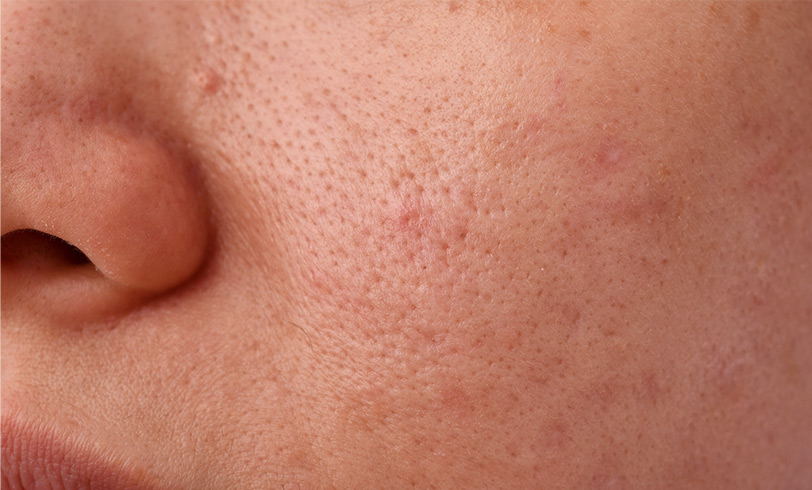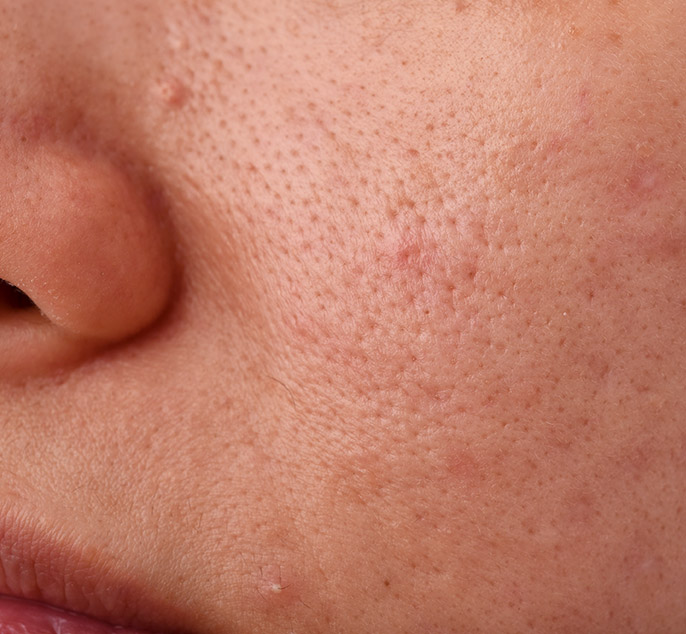

Open Pores
Treatments, Home Remedies, Tips & ResultsOpen pores are a common skin concern, characterised by enlarged skin pores that can make the skin appear rough and uneven. They often occur on the face, particularly around the nose, cheeks, and forehead, and can be associated with oily or combination skin types.
What Are Open Pores?
The term ‘open pores’ refers to enlarged skin pores that become more noticeable over time. The pores on the skin allow it to ‘breathe’ by releasing the sebum or natural oil onto the surface. However, large skin pores often appear in areas that have a higher density of sebaceous glands, specifically in the ‘t-zone’ of the face. They adversely affect the skin texture and become an aesthetic concern for both men and women with oily or combination skin types.
The skin concern affects teenagers undergoing hormonal changes and adults with ageing skin or hormonal issues, too! After knowing the meaning of open pores, it’s time to find out its causes. Also, explore effective treatments and preventive tips for minimising them, right here!
Causes of Open Pores
Enlarged open pores are a common concern and they develop over time due to internal and external factors ranging from genetics, sun exposure, to poor lifestyle, and skincare habits. Take a look at some of causes listed here in detail:
-
Excessive Sun Exposure
Sun damage may adversely affect the collagen and elastin fibres in the skin. Diminished strength and elasticity of the skin may make the pores appear crater-like in older adults.
-
Heredity Factor
Genetic predisposition and ethnicity are significant internal factors that cause large open pores.
-
Hormonal fluctuations
Hormonal changes during puberty or pregnancy also result in developing moles. Moles tend to become darker or bigger due to hormonal fluctuations in the body.
-
Chronic Acne
Pores in acne-prone skin clog and cause blackheads and whiteheads. Moreover, inflammatory acne weakens sebum glands and follicular openings and enlarges the pores.
-
Hormonal Changes
Hormonal fluctuations stimulate the hyperactivity of sebaceous glands and trigger excessive sebum production, resulting in large open pores.
-
Acute Skin Conditions And Nutritional Deficiency
Chronic radiodermatitis and vitamin A deficiency are other uncommon causes of enlarged skin pores.
-
Excessive Sebum Production
Excessive sebum secretion, especially in those with oily or combination skin, leads to the enlargement of hair follicle openings and the appearance of large open pores.
-
Increased Hair Follicle Volume
Hair follicles are tubular in structure. Thicker hair follicles have a bigger follicular opening that forms skin pores. These dilate further to allow the flow of natural oil and appear enlarged.
Diagnosis
Visual examination of the skin.
Assessment of medical history and skincare routine.
DermaScan for a detailed view of the skin's surface.
Are you at Risk?
-
Risk of skin irritation from treatments.
-
Potential for temporary redness or swelling post-treatment.
-
Recurrence if underlying causes are not addressed.
-
Possible emotional distress due to cosmetic concerns.
Prevention and Management
Choose non-comedogenic makeup and skin products
Clean your face
Moisturise your skin
Try retinol-based products
Use sunscreen regularly
Exfoliate Gently to remove dead skin
Treat your skin gently
Address your active acne
Use a clay mask
Don’t sleep with makeup
Follow a healthy lifestyle and balanced diet
Hydrate well
Topical & Oral Medications To Treat Open Pores
Advanced Open Pores Treatment
Treatments Explained
Prognosis
Please remember, no treatment can remove pores from your face completely or permanently.
- Effective treatments can significantly reduce the appearance of open pores.
- Consistent skincare routine and sun protection are crucial to maintaining results.
- Regular follow-up treatments may be necessary for long-term improvement.
- Results can vary based on individual skin type and severity of open pores.
Frequently Asked Questions On Open Pores
Q1. What Is The Difference Between Acne Scars And Open Pores?
A. Open pores occur due to excess sebum production that eventually leads to acne and scars.
Q2. Is It Possible To Close Open Pores Permanently?
A. No, it is not possible to permanently close open pores as they help us enjoy a healthy skin by releasing natural oils.
Q3. Do Open Pores Cause Acne?
A. Open pores do not directly cause acne. They are a sign of excess sebum production, which may lead to clogging of pores and acne if left untreated.
Q4. Are open pores curable?
A. Open pores are not curable. However, by opting for advanced medico-aesthetic treatment at Oliva, you can minimise them effectively.
Q5. Can You Shrink Your Pores?
A. Yes, medico-aesthetic treatment performed by experienced dermatologists can visibly reduce the size of your skin pores.
Q6. Is It Bad To Squeeze Nose Pores?
A. Yes, squeezing large pores on your nose can cause hyperpigmentation and scarring.
Q7. Are Open Pores Bad?
A. Large open pores adversely affect the texture and appearance of your skin and maybe a visible sign of premature ageing. However, there are many effective treatments available to decrease their appearance.
Q8. Do Pores Get Bigger As You Age?
A. Yes, with ageing skin pores may appear enlarged for some people. However, it varies from person to person.
Q9. What deficiency causes open pores?
A. Pores do not result from nutritional deficiency, though vitamin A deficiency may occasionally cause enlarged pores.
Q10. Can vitamin C reduce open pores?
A. Vitamin C acts as an antioxidant and protects the skin from the harmful effects of UV rays. It can also reduce skin inflammation and shrink open pores.
Q11. Which Food Causes Open Pores?
A. Processed foods and foods rich in carbohydrates and sugar, and dairy products, can increase hormone levels, and stimulate excess oil production and enlarged pores.
Q12. Do Hot Showers Open Pores?
A. Hot showers have no direct effect on the size of pores, but they can loosen dirt and debris from the pores and help unclog them. However, very frequent hot showers are not advisable.
Q13. Can Cold Water Close Pores?
A. Cold water can reduce inflammation and sebum secretion and soothe inflamed skin. Ice cubes can also temporarily improve the appearance of pores.

